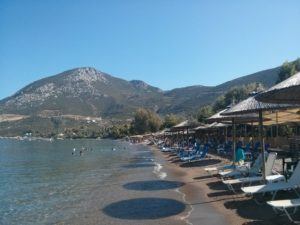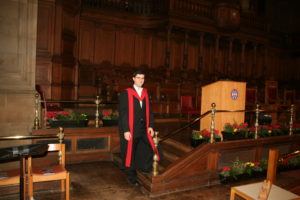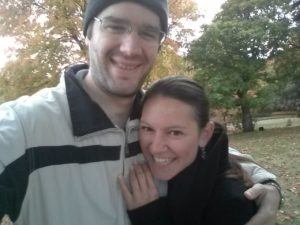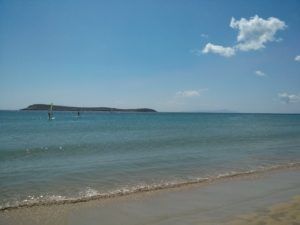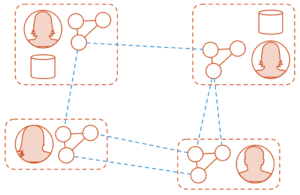Profile
Petros Papapanagiotou
Can't believe I won! Amazing! Thank you to all the students for the votes and the amazing questions!
Curriculum Vitae
-
Education:
Department of Informatics and Telecommunications, University of Athens, Greece (2001-2006) and School of Informatics, University of Edinburgh (2006-2007 and 2009-2014).
-
Qualifications:
I have a degree in Informatics & Telecommunications, an MSc in Artificial Intelligence, and a PhD
-
Work History:
University of Edinburgh, Hellenic Armed Forces, freelancer
-
Current Job:
Research Associate (Postdoc Researcher)
-
Employer:

School of Informatics, University of Edinburgh
-
About Me
I am Petros (Greek for Peter), a computer scientist and software engineer in Edinburgh.
-
Read more
I was born and raised in Athens, Greece. I’ve always been a computer geek, coding my own little programs and playing computer games with friends. I really enjoy math and logic puzzles, but also group sports (I used to play handball and hockey at school, now I play basketball with friends).
I studied in Athens and then decided to move to the UK to see and learn new things. I did my masters in Artificial Intelligence in Edinburgh and stayed here for a PhD and then a job as a university researcher.
I have only taken a 1 year break, because of the compulsory army service in Greece. I got to shoot a real gun!
I love working in the Uni, because it gives me a lot of freedom to explore cool technologies way before anyone can buy them! We have robots that play football and people that play solitaire with just their eyes (no keyboard or mouse)!
I recently married my wife, who is also Greek and a researcher in Chemistry and Biology. We enjoy going on Sunday or weekend excursions, usually around Edinburgh, and beach or forest picnics. We also visit Greece as often as we can, and go for road trips there. We love Greek food!
I spend the rest of my time watching TV or YouTube, playing video games, jogging, or playing basketball. I am also learning to windsurf during the summer! I’m trying to get better every time!
-
My Work
I develop smart software that helps people work better together. I work with NHS doctors quite a lot.
-
Read more
I research new ways to combine 3 things: workflows, social machines, and artificial intelligence.
Workflows are diagrams that show what people should be doing. For example, a workflow may show the safest way to treat a patient, the same way that a recipe describes the best way to bake a cake.
Social machines are like social networks (Facebook), but you also have computer programs as members. People and machines all work together, each doing their own part.
I use Artificial Intelligence (data, maths, and computer simulation -sort of like playing Sims-) to help people avoid making mistakes and collaborate faster when they work together.
I work with doctors and administrators in the NHS. I have been in hospitals, looking at how doctors work, what problems they face and how technology can help. I have worked with doctors specialising in HIV, severe burns, and anaesthesia. I also work with National Services Scotland (NSS) who gather data from patients all around Scotland and help researchers develop new therapies and treatments.
-
My Typical Day: My day usually involves either reading/researching, meeting with people, coding, writing, or a combination of these.
-
Read more
I spend most of my time doing one of the following:
Reading/researching: I need to read and understand what other experts around the world have done when facing with the same or similar problem as me, reuse existing tools or build on top of them and improve them. I need to “stand on the shoulders of giants“.
Discussing: This includes meetings (in person or online), emails, chats, etc. with colleagues and collaborators. We give feedback to each other on any progress made and brainstorm ideas on what to do next. I also talk to external people (e.g. NHS doctors), asking questions about their work and trying to understand their needs and problems. Finally, I go to talks and seminars by interesting people in and out of the University to learn about the latest developments.
Coding: This is the engineering part of my work, where I try to build useful programs. Sometimes it’s about building a specific program, sometimes it’s about exploring and testing possibilities, sometimes it’s data crunching, and sometimes it’s actually more like doing maths than coding. I use one of 4 different programming languages (Java, Scala, Python, OCaml) on a regular basis and occasionally others.
Writing: Academic researchers like me publish our results in public scientific articles or “papers”. Writing is hard and takes quite a bit of time, because you have to explain complicated things in a simple way. 3-4 weeks for a single paper is quite normal. Other experts will read our papers and decide if the work is good and worth publishing. Sadly, this means we may spend a month writing a paper that ends up being rejected because it’s not good enough. I also have to spend time preparing presentations and reports so that I can talk about my work to other friends and colleagues.
Most of my days will include more than one of these activities, because I work on multiple things. For example, I could spend an hour responding to emails, then have a meeting for another hour, then code for 2 hours, have a lunch meeting, work on my presentation slides, read a few articles and papers, only to realise it’s almost 7pm (which it is the moment I am writing this) and I should be home already.
-
What I'd do with the money
Start a YouTube channel with videos showing cool and fun computing and AI stuff to everyone and anyone
-
Read more
There are so many cool and fun things being built in computing and AI every single day. This is all happening so fast, that most people can’t keep up and younger ones such as you don’t even understand what is going on.
It’s so natural to be afraid of what you don’t understand. Are robots taking over the world soon? Is AI going to be smarter than us? What’s stopping us from developing self-driving cars? Or airplanes? Questions similar to what you are asking in here.
I would like to create a YouTube channel with weekly videos answering some of these questions as simply as possible. There are very few channels that try to do something similar (such as Numberphile and Computerphile), but even they end up using complicated words that you don’t understand and can be boring at times.
I want to make videos that are enjoyable, simple, and get people and students excited about all the cool stuff that are happening but don’t make the news. You will also be able to respond, ask more questions, and suggest more topics for videos.
The money can help get this channel started, set up some recording equipment and develop graphics.
-
My Interview
-
How would you describe yourself in 3 words?
Dreamer, geek, (over)thinker
What's the best thing you've done in your career?
I have had opportunities to collaborate with the NHS in projects that can affect healthcare for millions of people.
What or who inspired you to follow your career?
My dad who worked in a computing company and created opportunities for me to appreciate technology first hand. We would always have a computer at home which wasn't as common then as it is now. When I wasn't playing computer games, I would try to build them myself (not very sucessfully).
What was your favourite subject at school?
Maths by far.
What did you want to be after you left school?
I didn't know, but I loved programming and technology
Were you ever in trouble at school?
Not serious trouble, but who hasn't been caught doing silly stuff?
If you weren't doing this job, what would you choose instead?
Most likely a consultant, as I enjoy helping and supporting people and what they do.
Who is your favourite singer or band?
Hard to pick a favourite as I enjoy so many different genres. I listen to Globular and Arkasia a lot these days.
What's your favourite food?
Can't resist a good steak, souvlaki, or moussaka
What is the most fun thing you've done?
Travelled to Indonesia
If you had 3 wishes for yourself what would they be? - be honest!
I wish I could be more spontaneous and take more risks. I wish I could learn to play some music.
Tell us a joke.
Why is an elephant gray, large and wrinkled? - Because if it were small, round, and white, it would be an aspirin.
-

